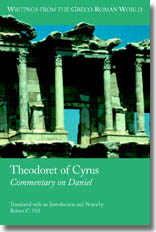SBL Press Bookstore

Theodoret of Cyrus: Commentary on Daniel
Robert C. Hill, Robert C Hill
ISBN
9781589831049
Volume
WGRW 7
Status
Available
Price
$42.00
Publication Date
June 2006
$42.00
Early Christians were fed by their pastors a solidly scriptural diet from both the Old and the New Testaments. The commentary on Daniel by Theodoret, a member of the school of Antioch and fifth-century bishop of Cyrus, illustrates the typically Antiochene approach to biblical texts and shows the commentator posing key questions such as, What is prophecy? or What does a prophet do? While demonstrating the moderation for which his approach to the Bible became proverbial, Theodoret here instructs his readers to see in the dreams and visions of Daniel the pattern of prediction and fulfillment that guarantees for an Antiochene the authenticity of true prophecy. This commentary, with Greek text and English translation on facing pages, will be valuable to biblical and patristic scholars, theologians, and church historians.
Robert C. Hill, Honorary Fellow and adjunct professor at Australian Catholic University, has translated many of the Old Testament commentaries of the Antiochene Fathers and written on their exegetical, hermeneutical, and theological features. He is the author of a number of works, includingTheodore of Mopsuestia: Commentary on Psalms 1–81 and Diodore of Tarsus: Commentary on Psalms 1–51, both available from the SBL.
“It is marvelous to have here both the text of Theodoret’s commentary on Daniel and the facing translation in flowing readable English. Robert Hill’s edition and translation sets a new standard in making patristic commentary available to modern readers, to which he has already contributed so significantly. As usual, the translation is footnoted with Dr. Hill’s learned and informative, not to say acerbic and droll, comments. His introduction manifests the same qualities as he helps us read Theodoret against the background of his times. A modern perspective means that (like Dr. Hill) I often disagree with Theodoret, but I also profit hugely from listening to Theodoret expound the scriptures in his day from outside the limitations of a modern perspective.”
—John Goldingay, David Allan Hubbard Professor of Old Testament, Fuller Theological Seminary
“Robert C. Hill is one of the leading experts on the School of Antioch. His fluent translation of, and critical introduction to, the sole Commentary on Daniel by an Antiochene, the remarkable Theodoret of Cyrus, is a major contribution both to patristic studies and to the history of exegesis.”
—Vincent Twomey, Editor of the Irish Theological Quarterly; Professor of Moral Theology, Pontifical University, St. Patrick’s College
Robert C. Hill, Honorary Fellow and adjunct professor at Australian Catholic University, has translated many of the Old Testament commentaries of the Antiochene Fathers and written on their exegetical, hermeneutical, and theological features. He is the author of a number of works, including
“It is marvelous to have here both the text of Theodoret’s commentary on Daniel and the facing translation in flowing readable English. Robert Hill’s edition and translation sets a new standard in making patristic commentary available to modern readers, to which he has already contributed so significantly. As usual, the translation is footnoted with Dr. Hill’s learned and informative, not to say acerbic and droll, comments. His introduction manifests the same qualities as he helps us read Theodoret against the background of his times. A modern perspective means that (like Dr. Hill) I often disagree with Theodoret, but I also profit hugely from listening to Theodoret expound the scriptures in his day from outside the limitations of a modern perspective.”
—John Goldingay, David Allan Hubbard Professor of Old Testament, Fuller Theological Seminary
“Robert C. Hill is one of the leading experts on the School of Antioch. His fluent translation of, and critical introduction to, the sole Commentary on Daniel by an Antiochene, the remarkable Theodoret of Cyrus, is a major contribution both to patristic studies and to the history of exegesis.”
—Vincent Twomey, Editor of the Irish Theological Quarterly; Professor of Moral Theology, Pontifical University, St. Patrick’s College
